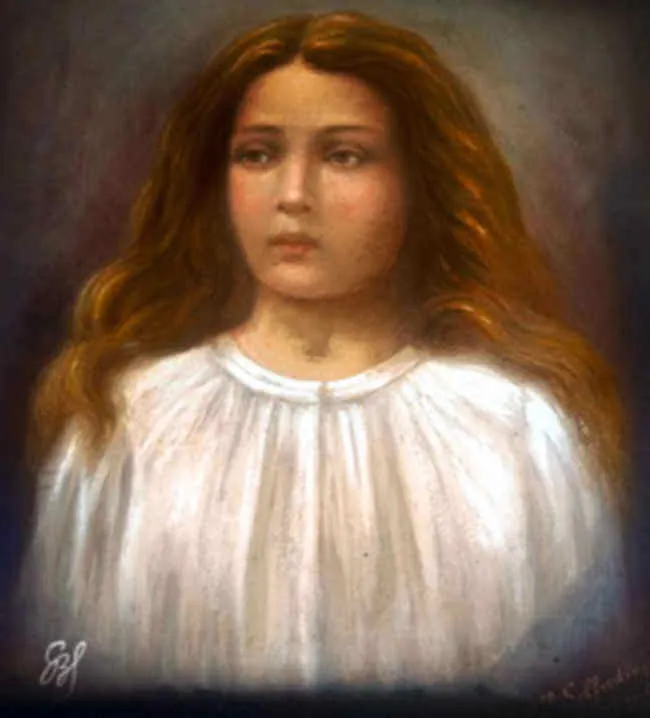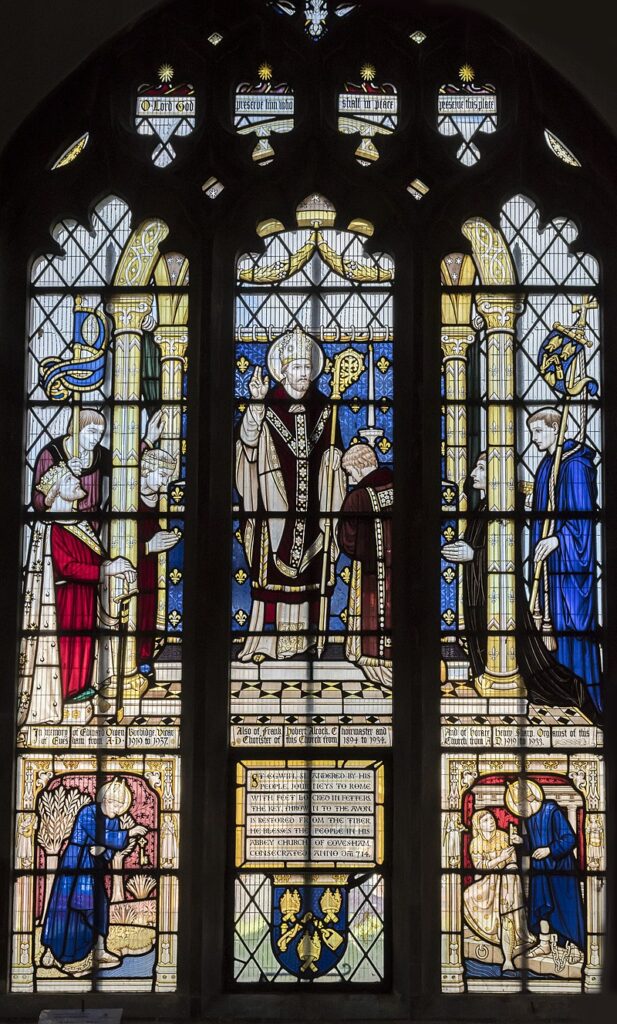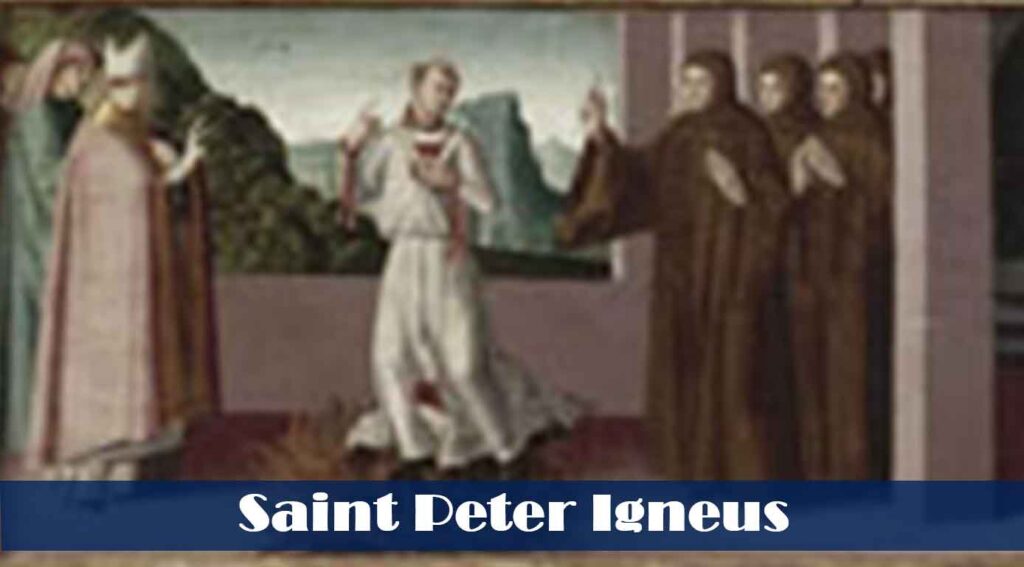1890–1902; Patron Saint of young people (especially girls), rape victims, and the poor; Invoked for the grace of mercy and forgiveness; Canonized by Pope Pius XII on June 24, 1950
Maria Goretti was born into poverty in Corinaldo, Italy. She was the third of seven children and was affectionately called Marietta by family and friends. Due to her family’s poverty, Maria was unable to attend school. She spent most of her time in the family home, performing chores and caring for her younger siblings. Her father owned a farm but lost it when Maria was only five years old. Hiring himself out as a farmhand, Maria’s father provided enough for his family to eat, but when Maria was nine, he died of malaria. To provide for her seven children, Maria’s mother began to work in the fields, with Maria taking on increased responsibility at home. Despite her lack of formal education and inability to read, Maria had deep faith. The family’s suffering from poverty and loss of their father did not diminish her faith; it strengthened it. When her mother began to lose hope during their difficulties, Maria habitually said, “Mother, be brave, God will help us.” Maria’s hope that her father would be freed from Purgatory led her to constant prayer, particularly the rosary.
When Mr. Goretti lost his farm, the Gorettis moved into a home shared with the Serenellis, Mr. Serenelli and his son Allessandro. Alessandro’s mother had suffered from a mental disorder and died when he was young. Alessandro’s brother suffered from a similar disorder, and their father was an alcoholic. As a result, Alessandro was a young man prone to anger who engaged in immoral behavior.
During the three years Maria and her family lived with the Serenellis, Alessandro made at least three sexual advances toward her. Each time she refused him. Outraged, he threatened to kill her if she told anyone, so she remained silent. When Maria was only eleven and Alessandro was twenty, he found Maria alone in their shared home, caring for her youngest sister and mending a shirt while her mother and older siblings were in the field working. Once again, Alessandro made a sexual advance toward her and she refused him. With an awl in his hand, Alessandro threatened to kill Maria if she refused him. “No! It is a sin! God does not want it!” she cried. She ran for the door, but Alessandro caught her and stabbed her fourteen times in the neck before running out of the house. As Maria lay bleeding on the floor, her little sister began to cry, catching the attention of her mother who came to investigate. After finding Maria stabbed and bleeding, she brought her to the local hospital where Maria survived for only a day.
At the hospital, the surgeon was surprised that Maria had survived that long. He immediately performed surgery without anesthetic. During the surgery, Maria woke up, and another doctor said to her, “Maria, think of me in Paradise.” Maria replied, “Well, who knows which of us is going to be there first?” The doctor said to her, “You, Maria.” To which Maria responded, “Then I will gladly think of you.” Before her death, Maria was able to express her forgiveness of Alessandro, further expressing her hope that she would see him in Heaven. She also received the last sacraments. On her deathbed, she told the Chief of Police that it was Alessandro who attacked her and added, “I forgive him, and I want him with me in heaven!” She died the following day.
In many ways, Maria’s brutal death marked the beginning of her new life. Her family was devastated, but they were also inspired by her faith, mercy, and act of forgiveness. At her funeral, many said of her, “A saint has died!” Devotion to her immediately began to spread and continues to spread today.
Since Alessandro was young, he was sentenced to thirty years in prison rather than life. During his first several years in prison, Alessandro remained defiant, refusing to repent. Although he knew that Maria had forgiven him, he could not accept forgiveness, nor admit his sin. However, when the local bishop, Giovanni Blandini, felt inspired to visit him in prison, things began to change. Around that time, Alessandro had a dream in which he saw Maria coming to him and handing him lilies, a symbol of purity. When he took the lilies, they burnt his hands and turned to dust. He wrote to the bishop thanking him for his visit, revealing the dream, and asking for prayers. In the years to follow, Alessandro underwent a profound conversion. After serving twenty-seven years of his thirty-year sentence, he was released.
Upon his release, Alessandro went to Maria’s mother, Assunta, and begged for her forgiveness, which she bestowed. “Who am I to withhold what my daughter so readily gave?” she responded. The next day, Alessandro and Assunta attended Mass together, receiving Holy Communion as if they were mother and son.
On June 24, 1950, Pope Pius XII canonized Maria and referred to her as the “Saint Agnes of the Twentieth Century.” Most remarkably, Maria’s mother and four of her siblings were present at the canonization. This was the first time a mother attended her child’s canonization. Even more remarkably, Alessandro was also present. Saint Maria’s prayers had truly worked a miracle of mercy, forgiveness, and reconciliation. Alessandro became a lay Franciscan brother, working as a gardener until his death at the age of eighty-seven.
Saint Maria Goretti’s short life and tragic death present us with so much more than a tragedy. They present us with hope—hope that even the most hardened sinner can repent and be saved. So often our world reacts with outrage toward sin, rather than mercy. Mercy is the defining virtue in the heart of Saint Maria, and this eleven-year-old girl should inspire us to work to overcome all anger, bitterness, and resentment toward the sinner. Ponder your own depth of mercy, or lack thereof, and allow this young child to inspire you to follow her example.
Source: https://mycatholic.life/saints/saints-of-the-liturgical-year/july-6—saint-maria-goretti-virgin-and-martyr/







